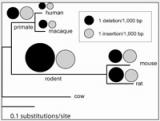
22/12/2011
Mutations caused by insertions of DNA short sequences are frequent than thought
The GRIB Evolutionary Genomics Research Group (UPF-IMIM) has described for the first time how insertions of one or more nucleotides in DNA are as common as deletions (the loss of a DNA fragment) in most mammals' genomes, in contrast to what was previously thought. The study has been based on a new algorithm, called Prank-F that makes better the detection of insertions.
Small insertions and eliminations of DNA sequences are responsible for a significant number of variations in mammals' genomes and seem to play an important role in the specific features of species. Furthermore, approximately 27,000 small insertions and eliminations of DNA sequences are involved in human diseases.
"There has been little investigation in the past about the role of insertions and eliminations of DNA sequences, because they are difficult to study. Our work shows that insertions and eliminations are also important in the function of proteins," said Steve Laurie, IMIM researcher and the first author of the article.
The study has enabled a better estimate of the possible bias between deletions and insertions in different evolutionary periods. "We found that there was a systematic loss of DNA sequences in the ancestors of modern rodents due to an increase in deletions," explained Mar Albà, ICREA researcher at the IMIM and coordinator of the Evolutionary Genomics Group of the Biomedical Informatics research programme (UPF-IMIM).
The repertoire of human genes is a mosaic consisting of genes with a very ancient origin, which are present in all euchariotic organisms, and other genes of more recent origin. The Evolutionary Genomics group uses comparative genomics to learn about the evolution and function of genes and genomes. Studies of insertions and deletions provide new data about the action of natural selection and evolutionary innovation on a molecular level.
This study increases the knowledge and the understanding of the processes involved in genome evolution. The results will be presented at the XI Bioinformatics Symposium, which will take place in Barcelona on January 23-25 2012. The next step will be to see how insertions and deletions affect genes which were duplicated very recently in evolutionary history.
Article de referència: “Sequence shortening in the rodent ancestor”. Steve Laurie, Macarena Toll-Riera, Núria Radó-Trilla, Mar Albà. Genome Research published on line November 29, 2011. Doi. 10.1101/gr.121897.111



